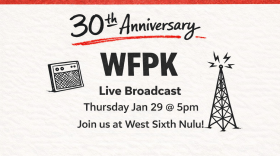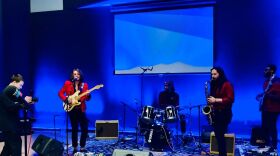Daryl Hall is a name synonymous with one of the most successful musical duos of all time, Hall & Oates. But beyond the timeless hits from that partnership, Hall has also carved out a solo career rich in variety, emotion, and innovation. In a conversation with Kyle Meredith, Hall dives deep into his solo compilation Before After, his unique sound explorations over the years, and how collaborations with artists like Robert Fripp and Dave Stewart have influenced his career.
Hall’s new collection, Before After, serves as a comprehensive look at his solo work, blending tracks from his solo albums with recordings from his acclaimed series Live from Daryl’s House. “I’ve been working in two parallel worlds for decades,” Hall says. “Everyone knows me for Hall & Oates, but not everyone is familiar with my solo work.” The collection showcases the full spectrum of Hall’s sonic exploration—spanning soul, jazz, R&B, and experimental rock—while still maintaining his core identity as a soul singer.
Hall notes that Before After is meant to bring attention to the body of work he has crafted on his own, distinct from his Hall & Oates fame. “People know the songs from Live from Daryl’s House, but not necessarily the recorded versions of my solo albums,” he says. This compilation aims to bridge that gap, presenting his solo material in a fresh, cohesive format.
One of Hall’s most lauded solo efforts is Sacred Songs (1980), an album created in collaboration with Robert Fripp of King Crimson. The album's progressive and experimental nature marked a departure from Hall’s more commercial work. Reflecting on that time, Hall says, “At the core, I’m a soul singer, but I explore a lot of different directions.” The collaboration was spontaneous, Hall recalls. For songs like "NYCNY," Fripp and Hall created the track in a single take, capturing raw, uninhibited energy.
While the album drew comparisons to David Bowie’s Station to Station era, Hall explains that the project felt completely natural. “I knew it was going to be different from the start. Robert and I came from different musical backgrounds, but that was the beauty of it.”
In 2011, Hall released Laughing Down Crying, an album that he refers to as his “family album.” The production was deeply personal, involving his late collaborator T-Bone Wolk before Wolk's sudden passing. “It started with T-Bone, and when he died, I had to scramble and figure out how to move forward,” Hall reflects. He was fortunate to bring in his close friends and collaborators, guitarist Paul Pesco and engineer Greg Bieck, to finish the album.
Hall’s unique blend of soul and beats stands out on this record, especially on tracks like “Talking to You (Is Like Talking to Myself)” and “Eyes for You (Ain’t No Doubt About It).” “The beats worked well for me,” he says. “It was an organic process.”
Hall’s long-running series Live from Daryl’s House has featured countless musical collaborations, many of which are part of the Before After compilation. “I started the show over 15 years ago, partly because of the SARS epidemic,” Hall says. The idea of performing from home came about when a Hall & Oates tour was canceled due to the outbreak. “I thought, what if this happens on a larger scale? What could be the alternative to touring?”
Hall’s foresight proved prophetic when the COVID-19 pandemic hit, and home performances became the norm. “It was funny watching everyone do what I had been doing for years,” he laughs.
One of the highlights of the Before After collection is Hall’s rendition of Eurythmics’ “Here Comes the Rain Again,” performed with Dave Stewart. Reflecting on that performance, Hall says, “Dave and I have a great relationship. That song is so well written, and stripping it down to its basics really showed how strong the songwriting is.”
Hall’s collaboration with Dave Stewart isn’t limited to Live from Daryl’s House. The two recently reunited to work on new music. “I was just in the Bahamas with Dave, and we’ve already recorded eight songs,” Hall reveals. Their collaborative process is intuitive, Hall says. “We like the same sounds, the same chord choices. It all comes together naturally.”
As for when fans can expect to hear the new material? Hall teases, “We’re still working on it, but we’ll get it done.”
Hall is preparing to hit the road once more, this time with longtime friend Todd Rundgren. The two share a musical bond that goes back to the early ’70s. “We’ve gone in and out of musical collaborations over the years, but I’ve always respected Todd’s work,” Hall says. “It’s going to be a fun tour.”
As Hall continues to navigate his multifaceted career, Before After serves as a reminder of the depth and breadth of his solo work. With more music on the horizon, his fans have plenty to look forward to.
Watch the interview above and then check out the video below.






